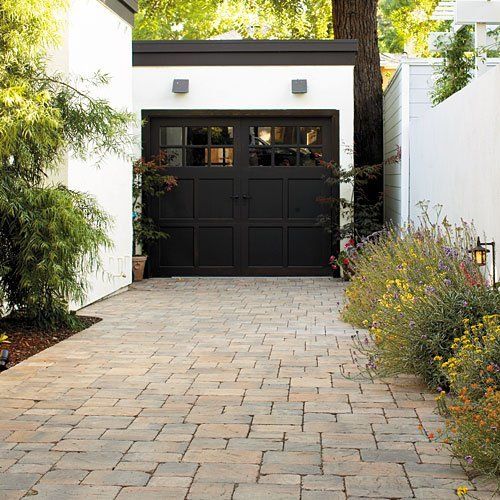s a homeowner fortunate enough to live by the beautiful coast, I was well aware of the benefits and challenges of coastal living. The mesmerizing ocean views and pleasant climate were undoubtedly a plus, but I also knew that the salty sea air could take a toll on the exterior structures of my home, including the garage door. After noticing signs of wear and tear on my current garage door due to saltwater corrosion, I knew it was time to find a more suitable and durable option for my coastal property.

According to Garage Door Repair, understanding the impact of saltwater on garage door materials became crucial in my quest to choose the right option for my home. Saltwater corrosion was the primary concern, as it could lead to premature deterioration and affect the functionality of the door over time. To ensure the longevity, durability, and continued performance of my garage door, I decided to explore various coastal garage door materials and their resistance to saltwater corrosion.
- Stainless Steel Garage Doors:
Stainless steel immediately caught my attention as one of the most corrosion-resistant materials available. The fact that it forms a protective layer, known as the passive film, when exposed to air was reassuring. This protective layer acted as a shield against rust and corrosion, making stainless steel garage doors a top contender for my coastal property.
The strength and durability of stainless steel further appealed to me, as I knew it could withstand the harsh coastal weather conditions. The low maintenance requirement was also a significant advantage, as I preferred a hassle-free option that wouldn’t demand constant upkeep.
While I was aware that stainless steel garage doors could be more expensive than other materials, I believed that the investment was well justified by their long lifespan and exceptional corrosion resistance.
- Aluminum Garage Doors:
Aluminum was another material that stood out as an excellent option for coastal garage doors. I learned that aluminum’s natural resistance to corrosion, without rusting, made it an ideal choice for areas with high salt content in the air.
The lightweight yet durable nature of aluminum was appealing, as I wanted a garage door that would be easy to operate and put less strain on the garage door opener. I also appreciated the customization possibilities, as aluminum garage doors could be designed with various finishes and styles to match the aesthetics of my home.
The only consideration I had was insulation, as aluminum garage doors might not offer as much insulation as some other materials. However, I knew that I could explore additional insulation options to address this concern.
- Fiberglass Garage Doors:
Fiberglass emerged as another popular choice for coastal garage doors due to its resistance to saltwater corrosion and ability to withstand harsh weather conditions. The fact that fiberglass doors were low maintenance and could be designed to mimic the appearance of wood was intriguing to me. I loved the idea of having a stylish option that wouldn’t be susceptible to rot or swelling, unlike real wood.
The corrosion resistance of fiberglass was a significant advantage, and I believed it would be a durable and long-lasting choice for my coastal property.
- Vinyl Garage Doors:
Vinyl garage doors were gaining popularity in coastal areas due to their resistance to saltwater corrosion and low maintenance requirements. The fact that vinyl did not rust, warp, or rot made it a durable option that could withstand the coastal climate.
I appreciated the low maintenance aspect, as I preferred a material that wouldn’t demand frequent upkeep, allowing me to enjoy my coastal lifestyle without added stress.
While vinyl garage doors may have limited color and style options compared to other materials, the corrosion resistance and low maintenance made it a practical choice for my coastal home.
Factors to Consider When Choosing Coastal Garage Door Materials
Considering the impact of saltwater corrosion, I knew I had to prioritize corrosion resistance when choosing coastal garage door materials. Additionally, I took into account factors such as strength, durability, maintenance requirements, aesthetics, insulation properties, and budget to make an informed decision.
In the end, I decided that stainless steel was the best option for my coastal garage door. Its unparalleled corrosion resistance, strength, and low maintenance needs aligned perfectly with my desire for a durable and long-lasting garage door. I believed that the investment in stainless steel would be well worth it, ensuring that my garage door would withstand the harsh coastal climate and continue to function optimally for many years to come.
In summary, based from the Garage Door Repair, living in a coastal area presented unique challenges, especially when it came to choosing the right materials for my garage door. Understanding the impact of saltwater corrosion on garage door materials was crucial in my decision-making process. After exploring various options, including stainless steel, aluminum, fiberglass, and vinyl, I ultimately chose stainless steel for its exceptional corrosion resistance and durability.
With stainless steel, I felt confident that my garage door would remain unaffected by the salty sea air and continue to serve as a reliable and functional entryway to my coastal home. By considering factors such as corrosion resistance, strength, maintenance requirements, aesthetics, insulation, and budget, I found the perfect coastal garage door material that would withstand the elements and enhance the beauty of my coastal property
Denzel Garage Doors
3414 N Ocean Blvd B, Fort Lauderdale, FL 33308, United States
954-466-8476
